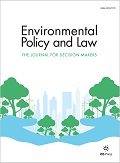Authors: Olujobi, Olusola Joshua | Irumekhai, Oshobugie Suleiman | Aina-Pelemo, Adetutu Deborah
Article Type:
Research Article
Abstract:
This study delves into the pivotal roles played by sustainable development and national integration in advancing legal compliance, environmental protection, and sustainability within Nigeria. Employing a doctrinal and conceptual legal research approach, it meticulously examines pertinent literature, international exemplars, and conducts an exhaustive analysis of primary and secondary legal sources, including the 1999 Constitution of the Federal Republic of Nigeria (as amended), the Climate Change Act of 2021, and relevant international instruments. An effort has been made to examine extant sustainable development practices, presenting an encompassing snapshot of the nation’s legal, environmental, and sustainability apprehensions, while also addressing the
…attendant challenges. Moreover, it undertakes a comprehensive evaluation of Nigeria’s prevailing legal framework concerning environmental protection, delving into its potential for long-term sustainability. The findings resoundingly underscore the potency of sustainable development as a strategic avenue for achieving legal compliance, environmental protection, and enduring sustainability. Importantly, the study unveils that the Sustainable Development Goals (SDGs) find manifestation within Chapter II of the Constitution, albeit in a non-justiciable form, thereby impeding the stride toward their attainment. Nevertheless, it accentuates the necessity for an approach that meticulously factors in Nigeria’s distinctive context and specific requisites, thereby fostering effectiveness through national integration, policy execution, effective communication, and collaborative synergy across stakeholders within both the public and private domains. Essential to the realization of SDGs’ objectives is a synergistic collaboration amongst the government, academia, and non-governmental organizations. This study illuminates the latent potential of sustainable development and national integration as efficacious strategies for propelling legal compliance, environmental protection, and sustainability. It proffers a recommendation for the assimilation of innovative paradigms that have proven successful in mitigating environmental degradation elsewhere. Ultimately, the study ardently advocates for comprehensive overhauls to systematically address Nigeria’s complex entanglements encompassing legality, environment, and sustainability. Furthermore, the study ardently champions the elimination of the provision stipulated in section 6(6)(c) of the 1999 Constitution as a crucial step towards realizing the SDGs’ objectives within Nigeria.
Show more
Keywords: Sustainable development, national integration, legal compliance, environmental protection, Nigeria
DOI: 10.3233/EPL-230050
Citation: Environmental Policy and Law,
vol. Pre-press, no. Pre-press, pp. 1-15, 2024





